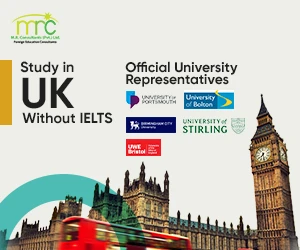Study in Germany Questions
What exactly is "Studienkolleg"?
For students whose school-leaving credentials are not recognized by German higher education institutions, Studienkolleg is a one-year preparatory course. Students take this course five days a week and learn German and subjects related to a specific degree program to pass the final exam. After passing the final exam, they are eligible and qualified to apply for a degree program at a German university. Your German language proficiency must be at least B1 to participate in a "Studienkolleg” course.
What exactly is "Fachhochschulen"?
Universities of Applied Sciences, also known as "Fachhochschulen," are meant to give students as much hands-on experience as possible. They are a great option for people who want to improve their skills and experience in the real world. Most of these universities' degree programs are in engineering and hard sciences. However, they offer Bachelor's and Master's degrees, but not PhDs, as do other universities.
What is ‘Studentenwerk’ in Germany?
In Germany, the Studentenwerk is a state-run non-profit organization that deals and assist with the student affairs. Studentenwerk is a local organization that focuses on covering one or more universities. By managing cafeterias, restaurants, and lodging, the organization serves students. It also offers the BAföG program, which helps students pay for school with loans and grants.
For what reason do students need TestAS?
Student’s capacity to meet the demands of the university program is evaluated by TestAS. For a student to be considered a legitimate candidate for admission to some universities, they must complete the TestAS. Contacting the university's International Office is the best way to determine whether this test is required.
Can I find more scholarship opportunities online?
Scholarships for international students in Germany are abundant. These include scholarships that are funded by the German government, like the DAAD Scholarship or Erasmus+, scholarships that are not funded by the government and German university scholarships. Check out the link to learn more about German scholarships
Are scholarships available for all academic fields in Germany?
The DAAD scholarship database primarily covers various scholarship opportunities in Germany. However, an exclusion applies to the medicine program.
German universities equipped with e-libraries and other E-learning material are free to access?
The majority of German universities have libraries that are well-equipped and contain the resources students require. Additionally, they have access to international e-libraries, from which students can download the required materials for learning and research.
Can a student from another country work as a volunteer, freelancer, or self-employed person in Germany?
Students outside the European Union can work 120 full days or 240 half days per year in Germany but are not allowed to be self-employed or freelance.
Can my spouse or children accompany me while I study in Germany?
You can bring your spouse or children to Germany if you have a residence permit. You can apply for a family reunion visa if your stay in Germany lasts longer than one year. In addition, you must demonstrate that you have sufficient financial resources to provide for your family in Germany without needing social assistance.
For an English program, do I need proof of German proficiency?
If a student’s program is not combined with any German taught subject then German language proficiency is not required to apply for the visa.
What’s the distinction between public and private German universities?
Public universities in Germany are funded by the state, meaning these German universities usually charge very low or no tuition fee. On the other hand, tuition fees are typically levied by private universities that also offer recognized degrees. However, both public and private German universities offer excellent education.
What is a state examination in Germany?
The state examination is an examination that the Federal State of Germany governs. It is administered by State invigilators, not the universities. This exam is a state qualification, not a degree from an academic institution. Those who have completed their master's degree and are interested in working as teachers, lawyers, pharmacists, or medical doctors must undergo this double examination. After that, they have to undergo professional practical training to prepare for the second state exam or start studying for a PhD. However, the candidate's success on this test does not guarantee employment.
Should I send the original documents or copies for my application?
You ought to submit the copies of your documents, not the original documents. However, before submitting your application, carefully read the university's requirements because each university/ institute typically has its own requirements.
How do I know that the actual application materials I sent has arrived to the university or uni-assist?
When your application materials are received, the university or application channel, such as uni-assist, will send you an email.
Is there a minimum age requirement to enroll in HEIs in Germany?
In Germany, you can study at any age. Any international applicant who meets the requirements for German higher education institutions can apply.
Can I take my health insurance after my arrival in the Germany?
Health insurance for the first three months of your stay in Germany is a legal requirement. You will then require health insurance to cover the remainder of your stay. To obtain a visa to enter Germany, you must have health insurance.
Can I travel to other countries in the Schengen zone as a foreign student?
Yes, with your German student visa, you can travel to other Schengen countries; however, you must adhere to the maximum duration of a short stay, which is 90 days in 180 days period.
How can a student travel around in Germany without a car?
You can pretty much rely on the German public transportation system that includes the underground, suburban trains, buses, and trams.
The most affordable cities for international students to live in Germany?
Bielefeld, Frankfurt (Oder), Halle, Krefeld and Passau are some of Germany's most affordable cities to live in for international students.
Study in Germany Interview Questions
Why you chose Germany as your study abroad destination?
Germany is renowned for its top-notch academic and practice-oriented programs at very low or no tuition fee. Germany's diverse culture, history, freedom and security are also valid reasons to choose Germany.
Why this specific city of Germany?
The way to answer this question is that “I did not choose the city” "I chose the university that is located in this city, and I am excited to explore the city as well". Also name some interesting spots of the city that you would like to see.
Why did you decide to take this course? Is it connected to your previous study field?
If your chosen course is relevant to your previous study field then you should really emphasize it during your answer and high ranking, course quality, practice orientation, alumni, and other factors may also influence the decision. And if the course is new and not relevant to your previous study then identify the factors that led you to select this particular course from among the many others.
How did you learn about this university, and why did you choose it?
Let them know how you got to know the university you are enrolled in and why you chose it. You can also state some facts about the university, i.e. the university’s rankings, appealing programs for international students, cheap study cost, scholarships and internship opportunities.
Is this course is not being offered by any university in your country?
You might come up with a clever response to this question by pointing out how Germany’s course structure and study quality is different from your country’s program. You can say that studying in Germany would be very beneficial to your future career because German universities offer a combination of modern knowledge and practical experience.
Which other German colleges and universities have you applied to?
Let them know if you applied to other German colleges and universities also mention their names and explain why you prefer to study at your current university. You can compare some facts about the universities in front of your consulate officer to explain your answer more clearly.
Which other German colleges and universities have you applied to?
Tell them you have been continually upheld by your family, friends, or a mentor from the beginning. Name the individuals who encouraged you the most to pursue your education in Germany.
. Why do you prefer to study in Germany over Canada or the United States?
Germany competes with other nations by offering study programs that are of the highest quality, practice-oriented and internationally focused, as well as studies that are inexpensive or free. Explain that studying in Germany is more financially feasible and affordable for you than studying in Canada or the United States.
Can you provide me with some facts about your University?
Provide a summary on university’s facts, including the name of the founder, the year it was founded, the main study fields, the number of students and graduates each year, the number of departments, the number of innovations and Laureates, internship programs, the kind of courses offered, the structure of the courses, the number of international-oriented programs, research programs, and so on.
Name some tourist attractions in Germany and why they are famous?
Mention a few of Germany's top attractions like museums, national parks, castles, the Berlin Wall, and other attractive locations and also briefly describe their distinctive characteristics.
Can you speak German?
In most cases, international students must know the German language at the B1 level or higher. If you were required to know German for your studies, just indicate your level of proficiency.
How many borders does Germany have and with countries Germany is sharing it?
Germany has total nine border sharing countries; Austria, Belgium, Czech Republic, Denmark, France, Luxembourg, Netherlands, Poland, and Switzerland.
Which German cities have the highest living costs?
There are five German cities known as the most expensive cities to live in; Munich, Hamburg, Frankfurt am Main, Düsseldorf and Bonn.
How many states are there in Germany and also name some of them?
The Germany has total 16 federal states, you don’t have to name all of them just mention the famous ones Baden Wurttemberg, Bavaria, Berlin, Brandenburg, Bremen, Hamburg, Hessen, Mecklenburg-Vorpommern, Niedersachsen etc.
The duration of your chosen course?
State the duration of your course and if asked also mention the number of semesters in your course.
What is the scope of your chosen course?
Please specify the main subjects and department of your studies. For instance, the name of the study program or course, the department and then its primary goals. Include the course's modules as well.
What is the structure of your chosen course?
Briefly explain the number of semesters, whether they are full-time or part-time, core subjects, credits per semester and total hours of instruction per semester, study methods, activities etc.
Which university are you going to attend and where is your university located?
Mention the full name of the university you are going to attend and the name of the city in which the university is located.
For what reasons do you think the university is awarding you a scholarship?
Mention your high CGPA, and TOEFL scores. Please also mention any other reasons you know for receiving a scholarship.
What advantages can this course offer you?
Mention the career paths you are expected to take after graduating from a German university, whether as an employee or freelancer. Inform them of the country's eagerness to hire qualified individuals with superior knowledge and practice and the lack of expertise in the field you plan to study.
What is the commencement date of your course?
Inform them about the start date of your course in Germany
What will be your total study cost each year in Germany?
Inform them of the anticipated tuition costs for the entire course and all study years.
Your chosen course goes by what name?
Mention the full name and short form of your chosen course for example Bachelor of Business Administration (BBA).
Do you have a letter of acceptance for studies that is either conditional or unconditional?
Mention the type of acceptance letter you got from the university to indicate whether you have met all of the requirements for the study and been accepted to register for it; if you still need to meet more of the requirements, you still need to meet another one. If you have a conditional (provisional) letter of acceptance for studies, it means that you have been accepted to study provisionally. It means that you must take the preparatory course for the final exam; if you pass the exam, your seat in the university will be confirmed.
Please name a few modules of the course you'll be taking?
Mention the most important modules or subjects of the course you are about to take, such as architecture's main sections: architectural design, the transformation of cities and landscapes, cultural heritage, and so on.
When do you intend to travel?
Your travel date must be the same as on your travel ticket and has to be early enough so you can make necessary arrangements before the beginning of your studies.
What was your most recent college degree? When did you get it? Who issued it?
Please specify the academic title you have earned and the institution that conferred it, as well as the year, month, and location of the institution that conferred it.
What was your final GPA at the end of your studies?
By providing supporting documentation such as your most recent degree-awarding certificate, you can inform them of the most recent GPA you have achieved by the end of your most recent studies.
What are your IELTS scores?
Simply state your IELTS scores and don’t mention other details unless you are asked to.
What was your busyness after your latest graduation?
Describe the activities and interests you have pursued since completing previous academic coursework. It could be a part-time job, attending training, participating in charitable activities, completing a reading list of science and academic books, researching, getting ready for a study abroad program in Germany, improving one's English, German, or other foreign language skills, social involvement, a voluntary job, an online job, taking care of someone in need, etc.
Have you taken any English language courses? Have you taken any other particular courses related to your studies?
If you were enrolled in such a course, please specify the English course and level of English you were being taught. Also, if you were taking a subject-related course to prepare for your future studies, discuss the main subjects covered. You could identify the school that offered these courses and provide associated dates if asked.
How will you pay for your education?
The circumstance might call for a variety of answers. You could be paying for your future education with money you have saved up, a study loan, a scholarship, or money from someone else who is sponsoring you (your father, someone in Germany, or someone else).
How much money do you have available for your stay in Germany?
Give exact figures for how much money you have in your bank account to use for studying and living in Germany. Prove that you have enough money to pay for your education and living expenses in Germany.
Who is funding your education in Germany? What’s their annual salary?
If you have a sponsor, tell them about your relationship with them, including their job title and annual salary. To support such a claim, you must present the required documentation.
What’s proof that your sponsor can support your studies in Germany?
To prove that you sponsor can support your studies, you have to provide some supporting documents such as certified income statement (with employment contract and 3 latest salary statements) and financial assets, if a parent is sponsoring. A letter of guarantee issued by the Foreigners Registration Office – if the sponsor is the permanent resident of Germany; or A scholarship awarding certificate – if you are planning to study with a scholarship.
Family members who are currently earning or employed?
Name every member of the family who is currently employed in a paid job. Be sure to mention their positions and, if asked, their employer's name too.
Explain how much you will be able to earn after completing your education?
Inform them of your annual salary for a job that might be available to you once you return from Germany as a graduate of a German university. In addition, if you already have a business idea, you should present the business plan, which should include expected annual profits, but make sure the figures are based on a realistic prospect.
Can you name some well-known researchers in your study field?
Mention a few researchers and innovators whose work has served as a model for you in the field you've chosen for your studies. It can be Alan Guth for the field of physical science, James Watson for the field of biological science, Einstein, Timothy Berners- Lee for other fields.
Where will you live in Germany? Type of accommodation?
Inform them of the type of accommodation you are choosing. International students in Germany usually choose student residence halls, hostels, private accommodation and shared flats or rooms. Provide the address and other details if you have already found your long-term residence in Germany, if not, show the reservation document for your hostel or hotel that includes the address if you intend to look for it while you are in Germany.
Do you have any relatives living in the destined country or in Europe?
Mention close relatives who currently reside in Germany or who have lived there in the past, if asked.
What are your plans during your upcoming vacations in Germany?
You must declare your intention to return to your home country during the semester break to see family. Show no interest in getting a job in Germany during your vacations or semester break.
What are your plans for the future?
The answer ought to demonstrate your desire to return home after completing your studies. Inform them that you are interested in starting a career in your country, working in a position related to your study, or starting your own business.
Do you intend to work there?
In general, you should say that you won't there work while you're studying. On the other hand, international students can only get a job while they are studying there in very limited circumstances. Check to see if your student status and the type of visa you hold allow you to work while you study or after. Nevertheless, you must demonstrate that getting a job there is not your primary concern.
Have you analyzed your career prospects?
Again, state that your goal is to return home to pursue a career related to your studies. This will demonstrate that you have no intention of remaining in Germany for work or to become a permanent resident. Demonstrate to them that you have conducted sufficient research and that your country has a large need for qualified individuals in your field.
FREE STUDY ABROAD
Free study abroad expert advice
Modal Title
Dear User Name
We Have sent a 4-digit code to your
mobile number



.gif)


























